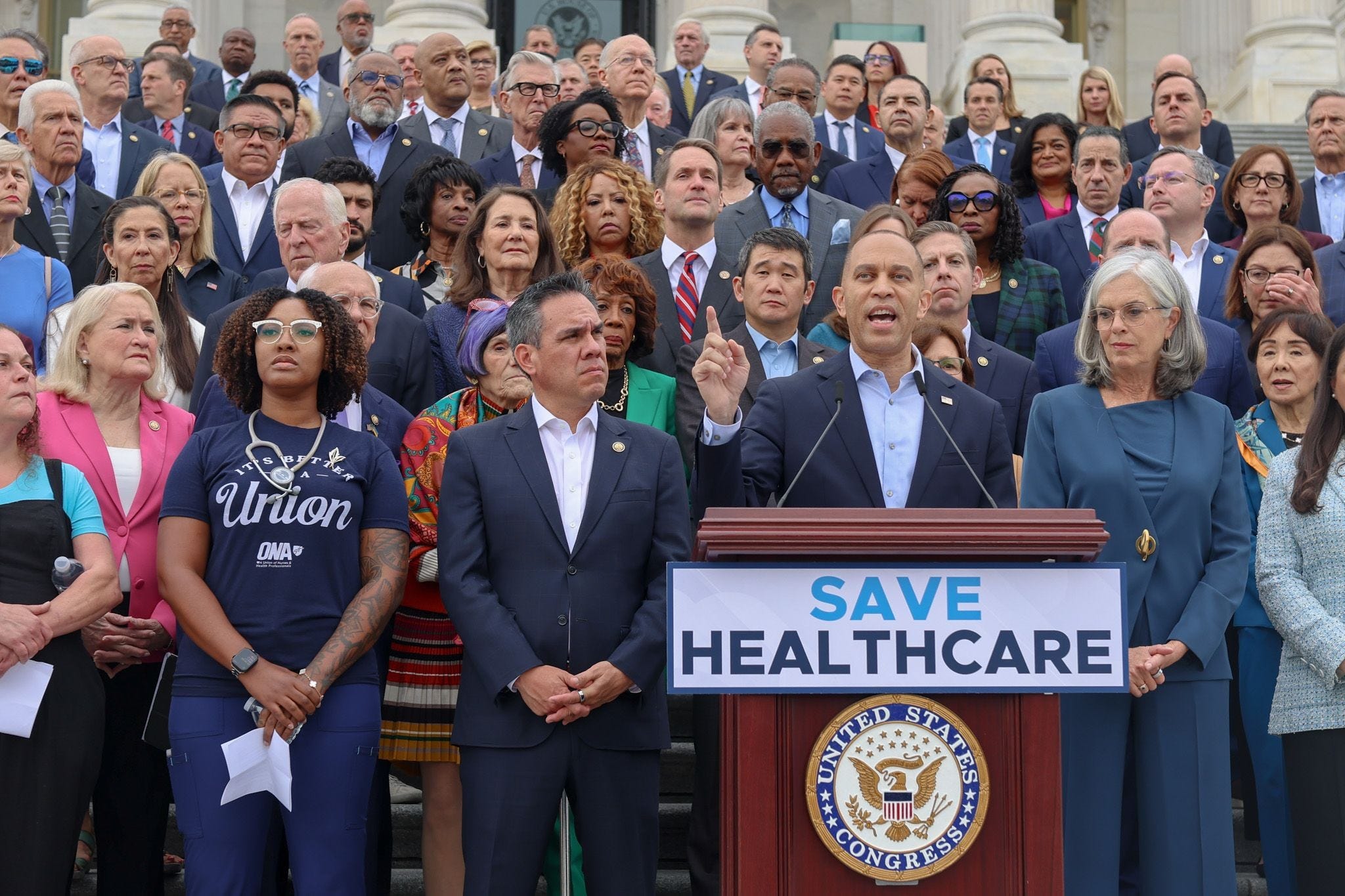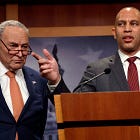How Democrats spent the day before the shutdown
With Speaker Mike Johnson sidelining the House, Democrats filled the Capitol with events to press their healthcare agenda ahead of a looming shutdown.

Few people would deny that President Donald Trump possesses the most powerful bully pulpit in the world. He plans to use it to bend the narrative in his political favor during what’s shaping up to be a prolonged government shutdown, beginning at midnight on Wednesday.
But Democrats have adopted a strength-in-numbers messaging strategy, both in the number of members on Capitol Hill on the final day of the fiscal year and the number of events they’ve staged to draw the American electorate’s attention to the concessions they’ve demanded in exchange for Democratic votes on an agreement to turn the lights back on.
At the top of that list?
Repealing the Medicaid cuts Republicans muscled through in the One Big Beautiful Bill Act, extending the Affordable Care Act’s enhanced premium tax credits before they lapse, and securing a commitment that the administration won’t claw back funds enacted through bipartisan agreements along party lines. Republicans have cast these demands as partisan non-starters while Democrats frame them as basic protections against what they see as a GOP health care crisis of Trump’s own making.
The daylong programming carried added weight since Speaker Mike Johnson (R-La.) canceled votes on the two days immediately preceding the funding deadline. Democrats—and some Republicans—called it a tactical misstep that suggested Johnson had effectively conceded a shutdown once it became clear the House-passed continuing resolution had no path through the Senate’s 60-vote threshold.
By idling the House floor at the decisive moment, Johnson undercut his own leverage and created space for Democrats to dominate the Capitol with their show of force—even as he met with Trump, Senate Majority Leader John Thune (R-S.D.), Senate Minority Leader Chuck Schumer (D-N.Y.) and House Minority Leader Hakeem Jeffries (D-N.Y.) at the White House on Monday afternoon in a last-ditch, longshot attempt to find a path forward.
“Democrats have Republicans on the ropes. Trump waited until the last minute to start negotiations, and those ultimately failed,” a Democratic source texted me. “Now, Democrats are flooding the zone on media and messaging, and the entire House Republican Conference is out of town on vacation. Hakeem Jeffries has his foot on their necks right now, and polling bears that out. This may get ugly, but I suspect Democrats will come out on top.”
House Democrats started the morning on the Capitol’s East Front Steps to uplift the stories of a single mom of two boys with autism who relies on Medicaid to provide their healthcare; a college professor undergoing cancer treatment, the cost of which is partially offset by Medicaid; and a surgical oncology nurse concerned about the impact of hospitals and clinics closing or reducing services due to healthcare cuts. (Jeffries also addressed the racist and transphobic deepfake video that Trump posted on social media Monday evening.)
The chairs of the seven major House Democratic groups—the Congressional Black Caucus, Congressional Hispanic Caucus, Congressional Asian Pacific American Caucus, New Democrat Coalition, Congressional Progressive Caucus, Democratic Women’s Caucus and Congressional Equality Caucus—expressed solidarity in their healthcare fight for the communities they represent.
Members then headed to the House chamber for a pro forma session where House Appropriations Committee Rosa DeLauro (D-Conn.) intended to ask for unanimous consent to pass the Democratic alternative to the House-passed Republican funding bill. But as quickly as the session’s presiding officer—Rep. Morgan Griffith (R-Va.)—gavelled the session in, he adjourned it and prevented the Democrats from making the symbolic UC request. (Who knew Morgan Griffith could move that fast?” a member told me after the incident.) During the pro forma, Republicans also refused to swear in Rep.-elect Adelita Grijalva (D-Ariz.), who won a special election last week to replace her late father and has pledged to be the final signatory needed to force a vote on legislation to release the Epstein files.
Around lunchtime, House Democrats decamped to the Capitol basement for lunch, where leadership encouraged members to stay in town through the end of the week. The Jewish holiday Yom Kippur takes place from sundown on Wednesday through nightfall on Thursday, so there’s an acknowledgment that some members will likely leave. If they do, the message from leaders is to stay on message. I’m told members who haven’t been through a shutdown before asked what to expect and received an update on the state of play in the Senate ahead of a vote on the House-passed bill and Democratic alternative. (Both bills failed to meet the 60-vote threshold, but two more Senate Democrats voted for the House bill who opposed it earlier this month.)
As I first reported, Jeffries is hosting a 24-hour livestream, where members are invited to participate from their offices, homes, or other suitable locations. Sen. Bernie Sanders (I-Vt.) also held a pre-shutdown livestream.
Across the Capitol, Sen. Mark Warner (D-Va.), Senate Finance Chair Ron Wyden (D-Ore.) and Sen. Jon Ossoff (D-Ga.) led 38 Senate Democrats in introducing a disapproval resolution to overturn a Trump administration rule they say makes it harder and more expensive to enroll for health coverage on the ACA marketplaces. (Rep. Emelia Sykes (D-Ohio) is leading the joint resolution in the House.)
And at the top of Senate Democratic leadership’s weekly press conference, Schumer slammed Trump for comments the president made in the Oval Office moments earlier about the possibility of his administration firing a significant number of federal workers to apply political pressure to Democrats to withdraw their demands.
“Well, there it is,” Schumer told reporters. “Trump admitted himself that he is using Americans as political pawns. He is admitting that he is doing the firing of people, if God forbid it happens. When he says he is doing things, he is taking ownership.”
Speaker Johnson has a simple explanation for why he canceled votes: The House passed a bill, and until the government is funded, his chamber will have little meaningful work to do. But Jeffries called that argument BS since the House Republican bill was dead on arrival in the Senate.
“So the notion that Republicans would get out of town before sundown, cancel votes and then try to project reasonableness is divorced from reality. Republicans have abandoned their posts,” Jeffries told me. “Their partisan spending bill is going nowhere because Democrats have made clear we’re not going to participate in the Republican effort to continue to gut the healthcare of everyday Americans.”
Rep. Troy Carter (D-La.), who served in Louisiana’s state legislature with Johnson before the two were elected to Congress, expressed deep disappointment in the speaker and House Majority Leader Steve Scalise (R-La.) for their unwillingness to negotiate with congressional Democrats.
“These cuts will hurt Louisiana. We’re not immune to the pain just because we have the number-one and number-two leaders in the United States House of Representatives does not create an immunity for the people of Louisiana,” Carter told me. “Of course, I’m disappointed that we have drifted so far away from a democratic process where we sit at the table and negotiate and find ways to fix the problems that will ultimately benefit the American people. But to just summarily walk away and to deny an opportunity to even talk about it, to say, ‘My way or the highway.’ That’s not the American way. That’s not how we operate.”
Carter added that Trump is the common denominator in the erosion of trust and cooperation between the two parties.
“This president doesn’t want it,” the Louisiana Democrat said. “What we see in this horrible budget is demonstrative of a government that seeks to run singularly from the Oval Office.”
For Democrats, the current fight is about protecting and extending current healthcare provisions. But many members I’ve spoken with since they returned from the August recess this month told me they view this showdown as an opportunity to show Americans that they’re not just anti-Trump.
“The American people know that Trump is robbing them. They know that Trump is bad, but they don’t know whether Democrats are strong enough to make things better for people,” Rep. Greg Casar (D-Texas), chair of the Congressional Progressive Caucus, told me. “And so it is important for us to talk about the terrible things that Trump is doing. But that’s not enough. We need to also show the American people that we’re willing to go to the mat for them to drive down costs and expand healthcare. I think this is an opportunity.



